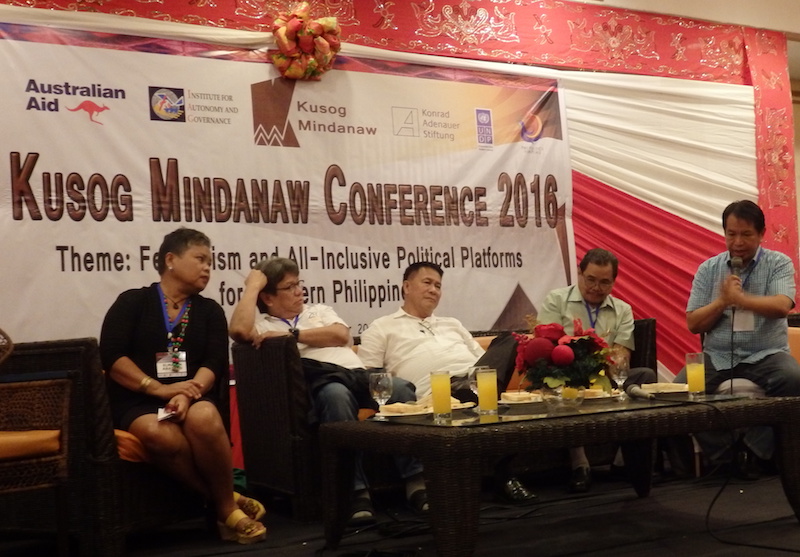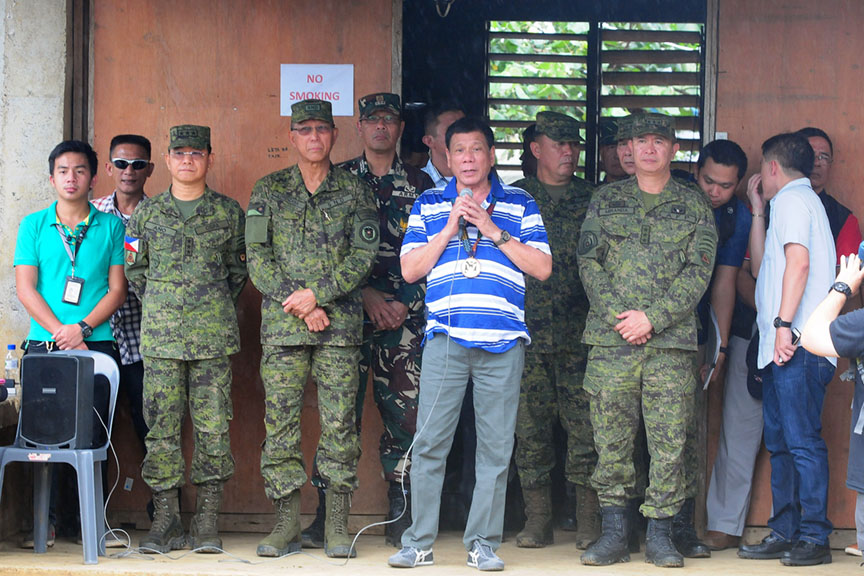A continued failure in implementing the peace agreements between government and the Bangsamoro revolutionary fronts will be the rallying point of extremists in Mindanao,” leaders of the Moro fronts said at the end of the two-day Kusog Mindanaw conference on federalism Wednesday.
“We, the MNLF (Moro National Liberation Front) and MILF (Moro Islamic LIberaton Front),…. we will become irrelevant if our peace agreements will not be implemented and in fact that is the issue, the rallying point of the extremists in Mindanao. They’re saying, ‘look at the MNLF and the MILF, their agreements have never been implemented. So there’s no point talking with this government who has violated peace agreements since time immemorial,’” said lawyer Randolph Parcasio of the MNLF under founding chair Nur Misuari.

Mohagher Iqbal, chair of the peace implementing panel of the MILF, said extremism “is part of human nature” and that even in schools, there are classmates who express extremist view. But violent extremism, he said, must be addressed.
He explained that “until and unless the historic injustices committed against the Moro people (are addressed), I think the extremist groups, the violent extremist groups would still multiply because they have so much reason to fight the government.”
But if the historical injustices are addressed “by the passage of a good (Bangsamoro) law, then the MNLF, the MILF can be partners of government and we have both the moral and the legal authority to do it,” he said.
“Please do not force my hand”
At least five groups have been reported to be engaging in violent extremism, even linking up with the ISIS (Islamic State of Iraq and Syrai): the Abu Sayyaf in the island provinces of Basilan, Sulu and Tawi-tawi; the Bangsamoro Islamic Freedom Fighters (BIFF) in Maguindanao and parts of North Cotabato and Sultan Kudarat; the Ansar al-Khilafah Philippines in Sarangani, Sultan Kudarat and South Cotabato; the Khilafah Islamiyah Movement in Lanao del Sur, allegedly founded by the Maute Group; and the Rajah Solaiman Movement.

In Butig, Lanao del Sur on Wednesday, Duterte warned the Maute Group: “Ayaw kong makipag-away sa inyo. Ayaw kong makipagpatayan but please do not force my hand kasi may limit ho naman ang problema na ito.”
He said he cannot be travelling to Lanao del Sur every month to talk and when he leaves, the killings will resume.
“There has to be a timeline. It could be forever. It could be during my term. It could be beyond my term. But there is certain limit. And when that limit comes, I’ll have to deal with you harshly,” he said.
At the 3rd ARMM LGU Summit here on Thursday, Duterte said he was willing to give members of the Maute Group plane tickets to the Middle East or give them five goats, for example, so they would stop disturbing the villages. He said it would be foolhardy for a group of 50 to fight the Armed Forces of the Philippines.
Global context
Assistant Secretary Dickson Hermoso of the Office of the Presidential Adviser on the Peace Process (OPAPP) said the public should not only look into the domestic scene but the global context to understand “why our young people now are into radicalism.”
Hermoso, a retired Army colonel who once served in the ceasefire committee of the government peace panel, acknowledged the frustration over the historical injustices in the country, especially the Bangsamoro whose struggle has not been addressed by the political settlement, but said those who have been lured into violent extremism were driven to it not just by the local situation but also by the global events.
“What is happening in Syria, Iraq, Afghanistan, Libya inspired them also… That is now the new danger that we are facing. That is why the vertical conflict (with the Bangsamoro fronts with whom government has signed peace agreements), to me, is done already. What we have are these new emerging groups. The youngblood, most of them are from the ranks of the mujahideens or the revolutionaries in the past,” Hermoso said.
But he quickly added that it is not only the Philippines that is facing the problem of violent extremism but also other countries in the region.
Addressing violent extremism
Hermoso said addressing violent extremism means going back to the basics. “Let us reorient their values… everybody can help … reshape the values, especially (because) they are very vulnerable.”
“Yes, they are influenced by what is happening now, but they are also influenced by what is happening outside because of the alleged persecution of the Muslims,” Hermoso added.
Parcasio said the MNLF is against extremism, specially a perverted interpretation of the Koran,” he said, adding the MNLF is fighting the Abu Sayyaf in Sulu.
He recalled that while serving as ARMM Executive Secretary in 1997, MNLF commanders in Jolo wanted to join the soldiers in fighting the Abu Sayyaf but the military commander “did not agree because he told us there is only one armed forces.” He said the MNLF instead offered the military intelligence reports on the whereabouts of the terrorist group.
Iqbal said the MILF is “trying our best to reach out not directly to the so-called extremist leaders but to their relatives and followers” and noted that they have been “quite successful,” claiming “one of the BIFF is inclined to the MILF.”
The BIFF broke away from the MILF in March 2010, shortly after Ustadz Amiril Umra Kato resigned as commander of the 105th Base Command of the MILF’s Bangsamoro Islamic Armed Forces. Kato died in April 2015.
Iqbal said their approach to the relatives and followers of the extremist group is dialogue.
“So mainly our approach to the extremist group, not to their leaders, is dialogue, dialogue. We try to explain to them that their view or their concept about Islam is not the way to interpret it,” he said.
http://www.mindanews.com/peace-process/2016/12/unimplemented-peace-pacts-will-be-rallying-point-of-extremists-in-mindanao/

No comments:
Post a Comment
Note: Only a member of this blog may post a comment.